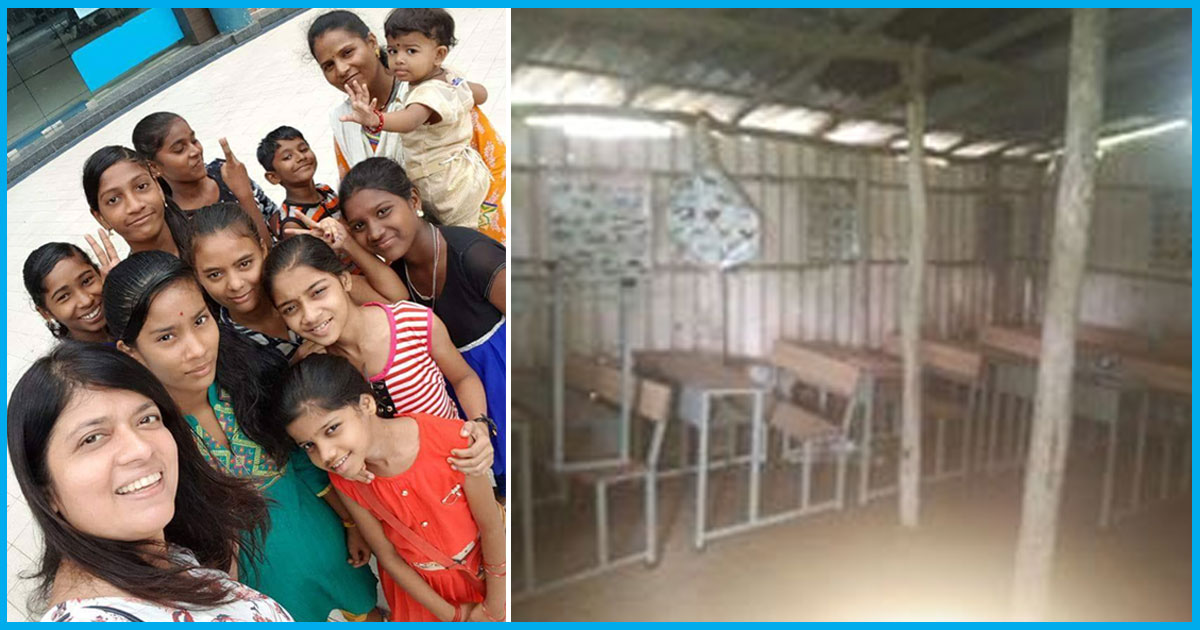
Crusade Against Addiction & Illiteracy; This Mumbai Teacher Is Helping Adivasi Kids Attend School
24 May 2018 2:41 PM GMT
Earlier this year, the social media went berserk after an old video of a young boy addicted to drugs went viral. Initially met with sympathy, the whole issue was later converted into a meme and whole sensitive issue of drug addiction in children was made a mockery of. Kumud Mishra, a teacher by profession in a Mumbai college is educating the tribal children. One of the first lessons she gives in her balwadi( (an Indian pre-school run for economically weaker sections of the society) is of good habits and how addiction is bad for them. Started with just 40 children, right now Kumud teaches 200 students in three batches. Not only has she helped them escape addiction, she has also streamlined them into formal education setups.
Humble beginnings
Kumud Mishra teaches Physics at a Mumbai college. She has always harboured a special place in heart for the underprivileged children.
“Earlier I was with children who worked as ragpickers, however, it became increasingly difficult for me as they would move from one place to another.”
She then came across Bhandup, an Adivasi settlement. “I could identify at least 40 kids that time who did not go to school in spite of two municipal schools in the vicinity.”

“I spent six to seven months just speaking to the people there. Through the interactions, I was able to build trust among them and understand why they were not sending their children to schools.”
Fight against drug addiction and illiteracy
She started teaching the tribal kids. “I was not providing formal teaching to them. I gave the kids slate and chalk piece and they would just scribble and draw whatever they wished to.”
Kumud found out that most of these children were addicted to drugs and alcohol. “Initially, my main focus was to teach them about basic good habits and educating them against various addiction.”

Within six months of teaching the children, they were admitted into the nearby municipal school. “I facilitated them in such a way that a 10-year child could attend school from 2nd standard very comfortably. I would teach them basic things like counting, Marathi alphabets and other basic things, helping them to cope up.”
Another breakthrough for Kumud came when she, with the help of Police was able to shut down seven-eight liquor selling shops. “Shockingly, these little children were addicted to alcohol. With the liquor shops closed, these kids had no other option but to concentrate on learning.”

Kumud initially faced challenges from all quarters especially the liquor shop owners and even the locals who did not show much interest. “The Adivasis who were earlier hesitant changed their minds after they saw the children who were attending the classes. They then built a proper balwadi for me to teach those children.”
Helping Adivasi children streamline into formal education system
The Adivasi Vikas Mandal helped the balwadi by providing benches and other infrastructure.

Now Kumud runs three sessions. “The first session is for kids in one to three years age group who are taught about good habits. The second session is for slightly older kids studying in middle school, I help them with their studies and the homework they are given in school. The third session is for children studying in the 10-12th standard.”
Kumud strongly believes that these Adivasi girls often are denied education. She works extensively to make sure that this does not happen. “Many girls dropped out of school and started working as househelps. We helped these girls to privately give their 10th standard exams. Many of those girls are now attending college, something they believed would never happen.”

Kumud credits the efforts of Child Welfare Department, who helped her at every step. “There was a woman who was planning to push her daughters into prostitution. I contacted the Child Welfare Committee, which acted promptly and the girls were shifted to children’s home.”
Kumud’s Balwadi is completely self-funded and as of today, she is teaching about 200 children.
She makes sure that every important day like Independence day and Republic day and even festivals of all faiths are celebrated. “My balwadi is self-funded, but I make sure we celebrate these important festivals in whatever small way we can.”

Kumud was running this balwadi solely on by herself until Shakuntala, an Adivasi woman herself joined. “Shakuntala was earlier working with the Adivasi Vikas Mandal. She got married. After she had the baby, she approached me saying she wants to work in the balwadi. I told her that I would be able to pay her a very nominal salary for which she agreed. Shakuntala has a zeal to do something for her community.”

Kumud has inspired two young girls to start similar balwadi in their slum area as well. “These two girls are in their twenties. Seeing the balwadi I run, they were inspired to start similar schools for children in the slum where they live.”
Inspiration and future plans
Kumud, who considers Lal Bahadur Shastri and Dr APJ Abdul Kalam as her inspiration said, “People often ask me why I bother myself teaching these Adivasi children. I say that these very children also form part of our society. Tomorrow when my child will grow up, he too has to live among them only. Progress of our society is possible only when we go ahead taking everybody together.”
Kumud’s aim is to completely end drugs and alcohol addiction among this children completely by 2040. She also wants to see all these children attend school and do well in their lives.
Her message to The Logical Indian is to do something for the society. She says, “We should do something in our lives so that when we die, we die leaving a mark.”
 All section
All section













